-
Cheaper to Replace by Marie Vibbert
We probably all have experiences with having something broken but it seems impossible or at least economical pointless to repair, and it is just easier and cheaper to buy a new one. So it is not unreasonable to imagine a future where planned obsolescence is applied to humanoid robots.
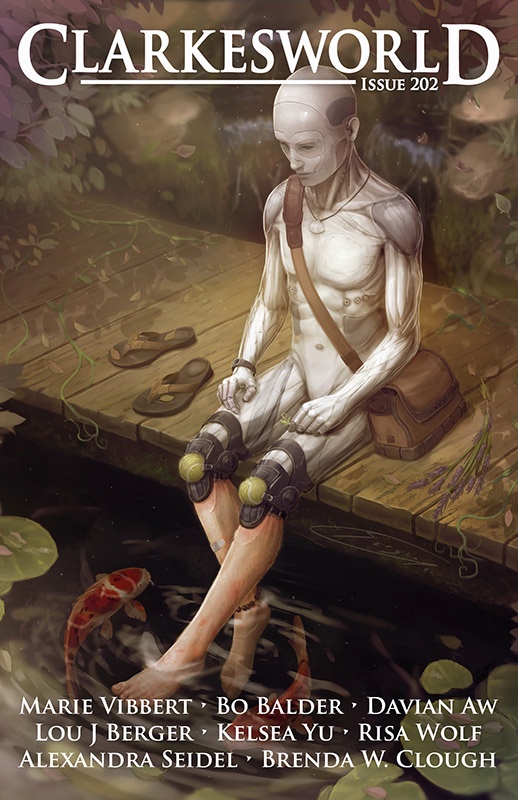
The story follows Hahn who is trying to repair her already old robot James. Everyone tells her it will easier to replace but she is clearly emotional attached to this very specific unit. There may be workarounds in their programming giving them the option of being functional just a bit longer.
It is very clear that the author wants to write a story criticizing planned obsolescence and she basically succeeds with this touching simple story. I just wish it had a little bit more than that, because while it has a couple of charming moments it never goes anywhere unexpected.
Read in Clarkesworld July 2023
Rating: 2+ -
Vast and Trunkless Legs of Stone by Carrie Vaughn
Aliens arrive on Earth but instead of saying “take me to your leader”, they say “I want a conversation with a normal person”. A familiar concept but slightly different.
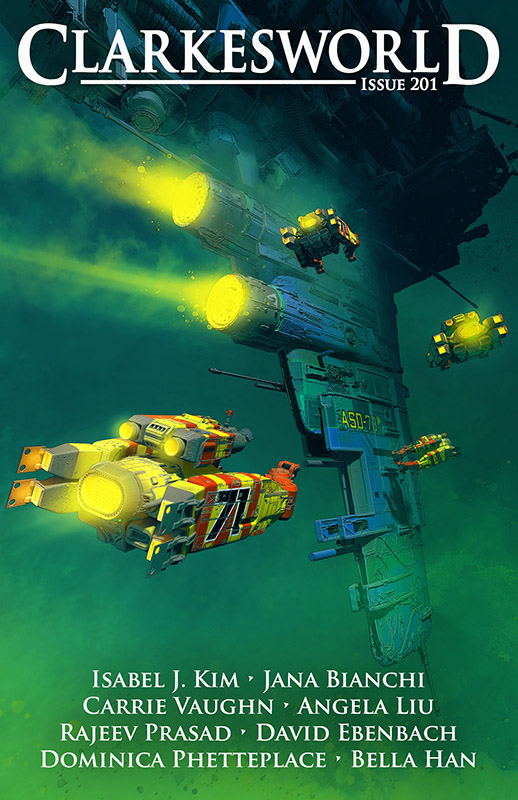
Mal has been chosen for the task and an army of government advisors have tried to prepare her for the conversation she is supposed to have alone with the alien. Unsurprisingly, all the plans for getting the secrets to their propulsion system goes out the window when the alien steers the conversation at something completely different.
It is a nice little story about first contact expectations and what really matters in the universe. The meat of the story is the unique conversation Mal has with the alien, where Vaughn really captures the nervous ramblings that would be likely for any person in that situation. I liked how the story writes itself into tbe tradition of more positive first contact stories and aliens with a mostly information gathering motivation.
Read in Clarkesworld June 2023
Rating: 3+ -
Better Living Through Algorithms by Naomi Kritzer
Clarkesworld has gotten a lot of media attention lately with its problems with AI-generated story submissions. We see plenty of negative effects of these new tools, but this short story manages to propose something a bit more constructive use of these tools - with respect to the more questionable moral dilemmas they also add.
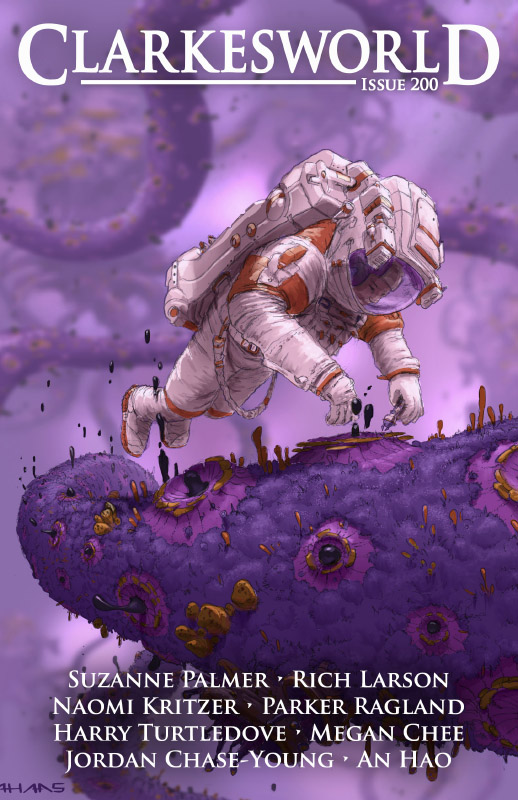
In this near future a journalists hears about a new app that apparently is great at helping people to be more productive and happier. At first she thinks it sounds like a cult thing with how every user talks about it a bit too passionately. She tries it though and the key element is that the app is built around a community where other users are instructed to make real phone calls to other users. Like telling them it is time to wake up and remind them of their personal goals. This turns out to be quite effective. As we all know, the motivation to actually do something is low if it is just an app telling you, but if you have a friend waiting for you at the gym - then you have to go.
The story centers around this journalist and how she tries to unravel who or what is behind this special app. What starts as a great community where people help each other is quickly ruined by an influx of scammers and commercial interests.
I found this story to be fairly realistic in what tech could evovle into in the near future, while also acknowledging how easily otherwise noble intents can be quickly ruined by a few bad people. Not unlike how AI tools are used today.
Read in Clarkesworld May 2023
Rating: 4 -
The Snack by Bud Spurhawk
This 10 year old story was quite fun to read today, because we aren’t far from the “app”-controlled future depicted here. When smartphones were new, the phrase “there is an app for that” quickly became popular. This story presents a near future where there is an app in practically everything, which isn’t far off from all the IoT devices we have today.
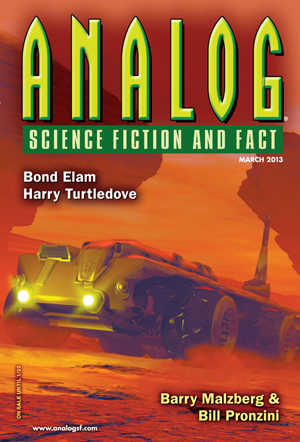
A man has his life controlled by various smart apps as he tries to loose weight hoping it will impress his new girlfriend. His fridge controls what he eats and his shoes how long he runs.
There isn’t exactly any hidden message here as the story is fairly straightforward about how we should make our own decisions in life. Should we satisfy the apps or the people we care about? A pretty good story that barely feels like science fiction here in 2023.
Read in Analog March 2013
Rating: 3 -
Tango Charlie and Foxtrot Romeo by John Varley
A couple of years ago I tried reading some of John Varley novels, but didn’t find them interesting. Reading his short stories is a completely different things. There are so many interesting stories from him the 70s and 80s, and this is just one among many in the big collection The John Varley Reader.
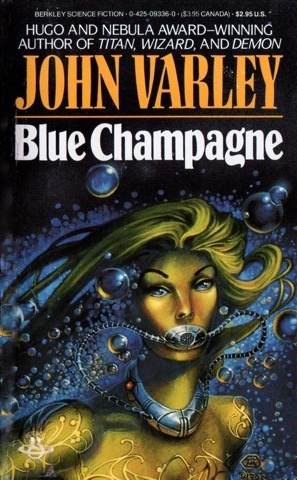
The basic setup for this story is really something else. A young girl stranded alone on an abandoned space station with only some dogs and plenty of alcohol for companionship. After years of living like this a Lunar police officer manages to get in contact with her, after it is discovered that someone is actually alive aboard this station that is about to crash. The mystery of who she is and why she is alive on the space station reveals a fascinating back story about a terrible virus that ravaged decades ago.
It is a very tragic and sad story, but not overly so because Varley often writes with a little added humor and lightheartedness. It wasn’t a particularly sad reading experience even though the actual story is.
Read in The John Varley Reader
Originally published in Blue Champagne
Rating: 4 -
Saving Galileo by Sean McMullen
Sean McMullen is an Australian author I have just recently discovered and have been very impresses with basically every short story I have read of him so far. His collection “Dreams of the Technarion” is worth checking out.
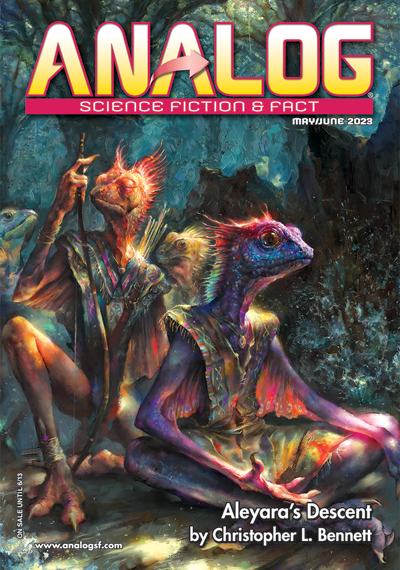
The story follows Lars who has worked as an engineer on a large telescope project located on the Moon. He goes on a sort of date with a woman who turns out to be a contract killer on a mission to kill him. Somehow Lars is neither surprised nor very upset about this. The assassin can’t help being curious about why this seemingly harmless engineer has a price on his head, so Lars gets to tell his story.
McMullen manages to create an engaging story even though it is on the surface just two people talking. The main character even acknowledges this directly:
I have found that questions are the best way to explain a difficult idea. Do an info-dump, and people’s eyes glaze over. Force them to follow a trail of reasoning, and you have a convert.
p. 117
Both characters are interesting and the actual mystery about what Lars know and why someone wants him dead was well done and original.
Read in Analog May/June 2023
Rating: 4 -
Piggyback Girl by M. H. Ayinde
A common thing for science fiction stories is to take a current trend and extrapolate it into a more extreme form. This short story looks at social media influencers in a future where the technology allows a bit more following than today.
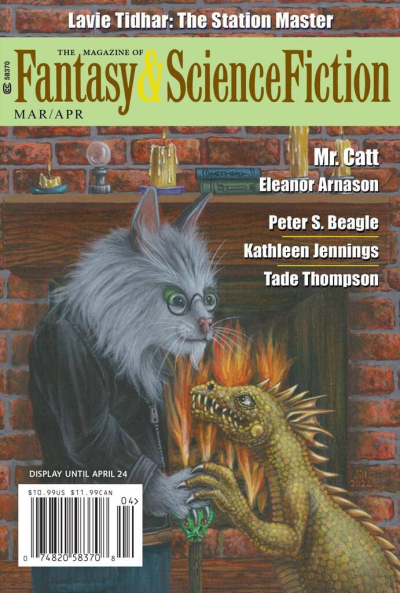
Amber is a popular influencer with many followers. She gets lured into taking it to the next level with an operation that gives her an implant in her brain, allowing her follows to hear, see and feel literally everything she feels. Anything just short of reading her thoughts. At first she is horrified, she didn’t read the fine print in the contract, but accepts her situation since it is only 6 months.
Most of the story is pretty straightforward and somewhat predictable with its message, however it takes a rather dark turn in the end. A good story but I was slightly annoyed that the whole premise relied too much on Amber not reading anything about what she actually signed up for. I thought that could have been handled better.
Read in Fantasy & Science Fiction, March/April 2023
Rating: 3 -
Immune Response by Robert R. Chase
This was a good and very Analog-_ish_ story with believable scientists doing science. Which I always love.
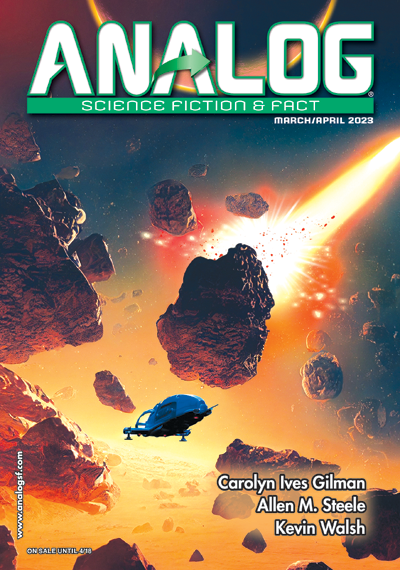
A young professor is given some papers from his former supervisor after his death. Among the papers is a long list of various mathematicians, physicists and cosmologists from around the world. Many names with a checkmark next to them, some without. One of the names is his own - without a checkmark. At first he tries to ignore it, but he becomes increasingly intrigued by the puzzle.
This will be a slight spoiler for the story, but I think most readers will be able to see broadly where this is going. The names that has a mark have all died - some of natural causes and others by more strange circumstances, usually at a young age. All were doing interesting work in their fields, though without any clear link. It is revealed that all the scientists were doing work that could potentially lead to the invention of time travel. And something is trying to prevent that of happening.
This premise have been done at least a couple of times before, but that doesn’t take anything away from Chase who has written an engaging and thought provoking story about the limits of scientific research.
Read in Analog March/April 2023
Rating: 3 -
Gravesend, or, Everyday Life in the Anthropocene by Paul McAuley
McAuley sets this long novella at around 2060 in a world trying to deal with climate change, though that is not central to the story - merely an inevitable pre-condition.
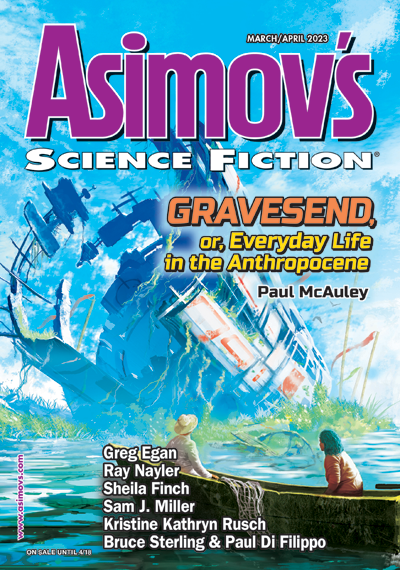
The plot moves rather slowly and mostly concerns world building, with a few somewhat crude jabs at what people in our present time did wrong. We follow Rose who suffers from being a victim to some sort of psychic weapon. She knows of a clinic in Czech Republic that might have a treatment, but she needs some money first. She comes across some information about a stack of soul chips that could be valuable. The so called soul chips was an attempt for people to upload their minds into a chip in the hope of living forever once the technology has advanced enough. Though it becomes pretty clear that it was more or less a scam based on crude machine learning creating superficial simulations of human personalities. However, in this lower-tech future some collectors find them intriguing.
This story is really mostly about our present and less about this future. The characters have plenty of conversations about our time and how people were back then, their hopes for the future and naive outlook that things could just continue forever. I think McAuley gets across what he wants to say without being overly didactic and still giving the reader an interesting story on its own.
Read in Asimov’s March/April 2023
Rating: 3 -
The Plus One by Marie Vibbert
A straight forward murder mystery on Mars. Except it is not outright murder, but someone is still responsible.
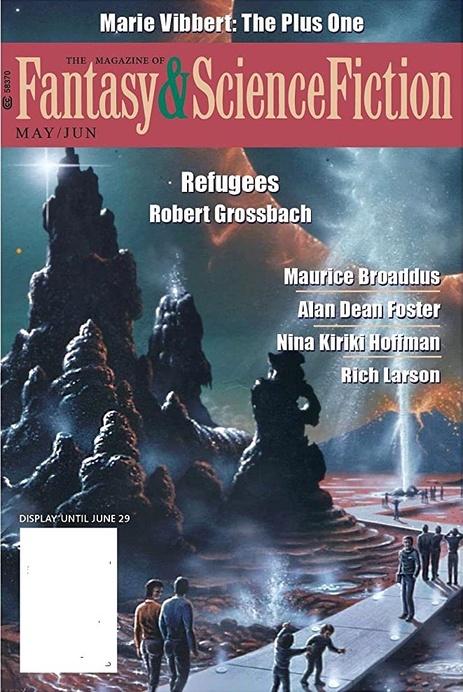
The setting is a settlement on Mars in its early stages and the story follows Blaine who is working as a marshall, serving the role of the practically missing law enforcement. A dead body of a woman turns up and he sets of to investigate how and why.
Might be a slight spoiler, but there is no murderer per se, but Blaine uncovers an unjust cooperate system that fails to take proper care under tragic circumstances. The woman was married to an employee stationed on Mars, but when he died of an illness, she lost any funding or rights to keep alive on Mars. There is a fine point to the story here about unemphatic cooperations not willing to take responsibility if they are not legally required to, but I had a somewhat hard time accepting this premise. If we ever get a settlement on Mars and have people employed on work contracts there, I am pretty certain lawyers and insurance companies would write up a plethora of clauses to handle every possible and impossible scenario. That aside still a decent story.
Read in Forever Magazine, March 2023
Originally published in F&SF May/June 2021
Rating: 2+